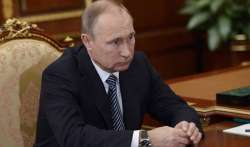The United Nationals General Assembly voted Russia off the UN Human Rights Council on Friday, a stunning rebuke to the country which is increasingly being accused of war crimes over its actions in Syria.
The 193-member General Assembly yesterday elected 14 nations by secret ballot to serve on the Human Rights Council, the United Nations body responsible for the promotion and protection of all human rights around the globe.
Brazil, China, Croatia, Cuba, Egypt, Hungary, Iraq, Japan, Rwanda, Saudi Arabia, South Africa, Tunisia, United Kingdom and the United States were elected for three-year terms beginning January 1, 2017. India is a member of the 47-member human rights body and its term will expire in 2017.
Russia was seeking re-election to the human rights body, competing with Hungary, Croatia and Bulgaria for two seats in the Eastern European bloc.
Russia was edged out in a close vote, getting 112 votes, just two shy of the 114 that Croatia polled, Hungary got 144 votes.
Russia's UN Ambassador Vitaly Churkin played down the importance of the loss.
"It was a very close vote and very good countries competing, Croatia, Hungary. They are fortunate because of their size, they are not exposed to the winds of international diplomacy. Russia is very exposed. We've been on council a number of years, I'm sure next time we'll get in," he said.
In Russia's loss, leading human rights organizations saw a strong message to Moscow condemning its policies in Syria.
Human rights groups had called for countries to reject the candidacies of Russia and Saudi Arabia, which has been accused of indiscriminate attacks against civilians in Yemen. Saudi Arabia's election, however, was a foregone conclusion since it was running unopposed for its regional seat.
"In rejecting Russia's bid for re-election to the Human Rights Council, UN member states have sent a strong message to the Kremlin about its support for a regime that has perpetrated so much atrocity in Syria," UN director at Human Rights Watch (HRW) Louis Charbonneau said in a statement.
Geneva-based human rights organization UN Watch described Russia s ouster from the Human Rights Council as a "positive outcome" of the election.
UN Watch Executive Director Hillel Neuer said the "non-election of Russia shows that the nations of the world can reject gross abusers if they so choose."
Moscow has faced severe international criticism for allying with the Syrian government, carrying out airstrikes to support the Syrian armed forces that have indiscriminately killed and wounded countless civilians.
Over 200,000 people are believed to have died in the Syrian conflict during the last five years.
China, Cuba, South Africa, Saudi Arabia and the UK were seeking re-election to the Council as their terms were set to expire in December this year.
HRW had strongly opposed the candidacy of Saudi Arabia, criticising its "widespread unlawful attacks" on civilians in Yemen.
Charbonneau said that Saudi Arabia, which was re-elected without competition, "doesn't belong on the council in light of its indiscriminate attacks on civilians in Yemen. We'll be keeping all members rights records under the microscope while they re on the council."
UN Watch said the re-election of China, Cuba and Saudi Arabia, "regimes which systematically violate the human rights of their citizens, casts a shadow upon the reputation of the United Nations."
Neuer said the world's highest human rights body was now dominated by a "majority of 53 per cent which are non-democracies".
"The UN's election of Saudi Arabia as a world judge on human rights is like a town picking a pyromaniac to be the fire chief," said Neuer.
Latest World News

